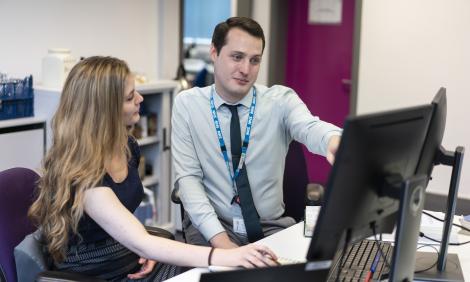Finance staff
NHS finance staff make sure sure that our budgets are spent wisely and for the benefit of our patients.
Working life
The NHS has to be sure that its finances are well run and our finance staff are crucial to making sure this happens.
Finance staff could be:
- working in the payroll department, making sure all their colleagues get paid
- handling payments for goods and services in an accounts department
- purchasing goods and services in the procurement department
Senior finance managers could be:
- setting and managing budgets
- making decisions on how money is spent
- tracking and checking budgets to make sure money has been spent correctly
The roles
Job roles have different titles. Some titles reflect the type of job and the level, for example
- accounts assistant or accounts payable clerk
- ledger controller
- finance officer or procurement officer
- finance clerk or finance assistant
- accounting technician or management accountant
- financial analyst
- payroll manager, finance director or head of finance
Finance staff may be based in office areas of hospitals and health centres or in headquarters buildings. They work closely with admin staff and others in the wider healthcare team. They may also work with clinical and non-clinical managers. Most finance staff have little or no contact with patients.
Lydia Wager
Income and costing accountancy assistant
Read Lydia's storyBeing able to relate my work to helping someone in the hospital is the driving force for me.

Entry requirements
Finance staff in the NHS will usually work towards a finance-related qualification. You can either
- enter as a trainee and study while you work
- take a relevant finance qualification and then apply to join the NHS
To enter as a finance trainee, you usually need at least 2 GCSEs including English and maths, or equivalent. Employers may also ask for IT skills. They may expect some customer service or office experience.There are apprenticeships in finance departments.
If you join the NHS with a finance qualification this could be one with no set entry requirements such as
- an AAT (Association of Accounting Technicians) Certificate or Diploma
Or you can study at a higher level, for an accountancy qualification awarded by one of the member bodies of the CCAB (Consultative Committee of Accountancy Bodies) for example
- CIPFA (Chartered Institute of Public Finance and Accountancy) Professional Qualification - you need two A levels and three GCSEs (or equivalent qualifications) including maths and English
- a degree in, for example, accounting or accounting and finance
It is important to check with your employer regarding the accountancy qualifications that they support.
For an accounting degree, you usually need
- two or three A levels, including maths, along with five GCSEs (grades A-C), including English language and maths
or alternative qualifications, including
- BTEC or HNC which includes maths or business
- relevant vocational qualifications
- access course which includes maths
- equivalent Scottish or Irish qualifications
However, each institution sets its own entry requirements, so it’s important to check carefully.
If you have a degree in a non-finance subject, you can apply for the NHS Graduate Management Training Scheme and work towards professional accountancy qualifications.
NHS Finance Insights placement scheme
The NHS Finance Insights placement scheme offers paid NHS work experience to year 13 students from lower socio-economic backgrounds, studying at a state sixth form or college and are not planning on going to university. It provides a 12-month experience in an entry-level finance role, helping you to develop new skills and gain on-the-job work experience.
Personal characteristics and skills
Finance staff have to be
- interested in figures and money
- accurate and methodical
- honest
- able to work to deadlines
- able to follow instructions and procedures
- willing to use IT-based systems
They also need
- numeracy skills
- IT skills
- organisational skills
Where an NHS finance career can take you
Finance staff are encouraged to take further qualifications. They can become members of the Association of Accounting Technicians. Once qualified, finance staff can apply to become
- chartered accountants with ICAEW (Institute of Chartered Accountants in England and Wales)
- chartered public finance accountants with CIPFA (Chartered Institute of Public Finance and Accountancy)
Those on the NHS Graduate Management Training Scheme will study for CIPFA qualifications.
Finance staff can also become members of the Healthcare Financial Management Association (HFMA). HFMA organises conferences and events where staff can keep up to date and network with others and provides e-learning to update skills.
-
Most finance staff (except the most senior managers) working in the NHS are paid on the Agenda for Change (AfC) pay system. You will typically start in a post at AfC band 2. With further training and experience, you could apply for more senior positions such as finance officer at band 3 or team leader at band 4. There are managerial roles in finance at more senior levels. Finance staff in the NHS work standard hours of around 37.5 a week.
Terms and conditions will usually be different for financial staff working outside of the NHS.
-
With experience, finance staff can become team leaders supervising the work of other staff. They can progress to become managers responsible for a department or area. Some progress to senior roles such as head of finance or finance director.
With a finance qualification, there are opportunities outside the NHS, including overseas.





